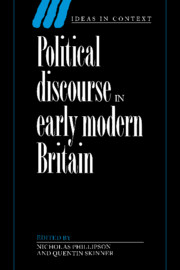Book contents
- Frontmatter
- Contents
- Contributors
- Preface
- PART I
- PART II
- PART III
- PART IV
- 13 Shaftesbury, politeness and the politics of religion
- 14 Propriety, property and prudence: David Hume and the defence of the Revolution
- 15 The rhapsody of public debt: David Hume and voluntary state bankruptcy
- 16 Universal monarchy and the liberties of Europe: David Hume's critique of an English Whig doctrine
- PART V
- A bibliography of the writings of J. G. A. POCOCK
- Index
- Ideas in Context
13 - Shaftesbury, politeness and the politics of religion
Published online by Cambridge University Press: 07 May 2010
- Frontmatter
- Contents
- Contributors
- Preface
- PART I
- PART II
- PART III
- PART IV
- 13 Shaftesbury, politeness and the politics of religion
- 14 Propriety, property and prudence: David Hume and the defence of the Revolution
- 15 The rhapsody of public debt: David Hume and voluntary state bankruptcy
- 16 Universal monarchy and the liberties of Europe: David Hume's critique of an English Whig doctrine
- PART V
- A bibliography of the writings of J. G. A. POCOCK
- Index
- Ideas in Context
Summary
In the early eighteenth century, the language of ‘politeness’ concerned sociability and gentlemanliness and cannot as such be said to have been a peculiarly political language. However, it was a language that was easily politicised and, indeed, has come to appear central to understanding early-eighteenth-century political culture, especially Whiggism. Nonetheless, there has been little detailed analysis of how ‘politeness’ operated as a political idiom, even in the writings of Joseph Addison, Richard Steele and the third earl of Shaftesbury, who crystallised the notion. Indeed, there has been almost no writing at all on Shaftesbury (1671–1713), although his Characteristicks of Men, Manners, Opinions, Times, first published in 1711, deployed ‘politeness’ for political purposes in an elaborate and highly sophisticated manner. This essay takes Shaftesbury seriously as a Whig writer of the first importance. In turn, taking Shaftesbury seriously illuminates the ways in which ‘politeness’ could operate as a medium of political discourse.
One remarkable feature of Shaftesbury's writing is the degree to which his discussion of religious and ecclesiastical matters was penetrated by the idioms of sociability and ‘politeness’. He contended that Characteristicks was, among other things, a ‘Plea for Complacency, Sociableness, and good humourin Religion’. One direction in which this claim points is Shaftesbury's ‘deism’, a contemplative worship of divine order arising out of natural affective sociability. Shaftesbury eschewed virtually all the distinctive attributes of Christianity and indicted certain Christian doctrines for their hostility to true sociability, though he was also capable of maintaining that Christianity was ‘in the main, A witty and good-humour'd Religion’.
- Type
- Chapter
- Information
- Political Discourse in Early Modern Britain , pp. 283 - 301Publisher: Cambridge University PressPrint publication year: 1993
- 6
- Cited by



